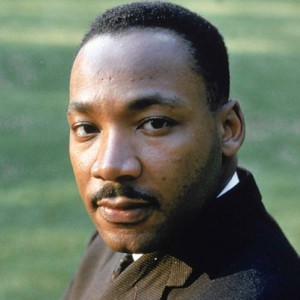Compassion and Nonviolence: The Humanism of Martin Luther King

This article previously appeared in Humanist Network News on January 18, 2011.
Martin Luther King Jr. once said, “Nonviolence means avoiding not only external physical violence but also internal violence of spirit. You not only refuse to shoot a man, but you refuse to hate him.” On this January 17 holiday held in his honor, his words hang over crippled a nation, at war with foreign regimes, but most alarmingly, at war with itself. In the aftermath of the tragedy in Tucson, Arizona that killed six people and left U.S. Representative Gabrielle Giffords in critical condition, the media’s narrative has begun to quiet, leaving us to ask ourselves unsettling questions. Why did this happen? What’s wrong with our country? And how do we make it better?
This final question fueled King as the Civil Rights Movement began to take shape in the 1950’s. In 1955, King led the Montgomery Bus Boycott, a campaign which saw the end of segregation of Montgomery public buses. His marches, most notably his 1963 March on Washington, influenced legislation such as the enactment of the Civil Rights Act of 1964 and the Voting Rights Act. Though a Baptist minister and leader of the Southern Christian Leadership Conference, King valued the separation of church and state, and lamented religion’s historical ties to violence, ignorance, and deception. Jeff Nall, a humanist activist, expands on this further in his 2005 article, “Remembering the Humanism of Martin Luther King,” and discovered that King even denounced organized religion for its support of war:
“In a world gone mad with arms buildups, chauvinistic passions, and imperialistic exploitation, the church has either endorsed these activities or remained appallingly silent. During the last two world wars, national churches even functioned as the ready lackeys of the state, sprinkling holy water upon the battleships and joining the mighty armies in singing, ‘Praise the Lord and pass the ammunition.’ A weary world, pleading desperately for peace, has often found the church morally sanctioning war.”
King was full of surprises, with a wisdom stemming from Gandhi’s non-violent activism. His life was lead with intense resolve, intense resolve mapped out carefully with gentle hands. While his passion and convictions ignited an entire country, he did so without burning it to the ground. Members of King’s Civil Rights Movement had good reason to light angry matches—their value as human beings degraded, their children spat upon, a history of oppression and abuse close at their heels. Yet, this injustice, this clash of culture and principle, was met with deep thought, not threat.
Violence is not only found in firearm metaphors and crosshairs. Violence is yelling “fire!” in a crowded room. Violence is grandstanding political agenda in times of tragedy. Violence is pointing a finger with all the hatred and destruction of a gun.
Martin Luther King Jr. led by example, without violence and without malice. Amidst America’s inflammatory riots and hostile fall-outs, beneath the furious embers and the stifling ash, lives the legacy of a man who knew truth hinged not on volume and spin but on compassion: “At the center of non-violence stands the principle of love.”
